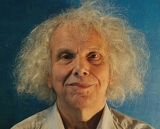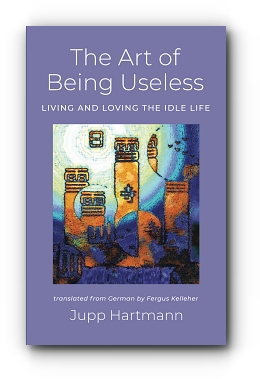| ||||||||||||||||
| Category: Philosophy |
(requires Adobe Reader)
|
| About the Book | |
|
Is it possible to live our lives according to a philosophy? What happens when people ‘unwire’ themselves from the social, political, and religious ideologies of their time? What do they replace them with? To the backdrop initially of post Nazi Germany with its very heavy historical load Hartmann takes on these and other questions. He further explores them while teaching, creating art and dancing Tango in Argentina, China, Turkey and elsewhere while living the productive life of the Idler everywhere. Though he references various thinkers – Aristotle, Christ, Nietzsche and others - he primarily explores Zhuangzi's espousal of the non-busy life. Hartmann regards him as a lifelong companion and teacher on the Tao concepts of emptiness, usefulness and the idle life. Under particular scrutiny comes Western work culture and its personal, social and environmental toll. Zhuangzi provides observations that are as valid for our times as for his. Hartmann’s tale does not claim to be a one size fits all, follow these steps manual to enlightenment but is instead an account of how one person followed their path with a wonder, respect and reverence for life. It is told in a folksy way depicting the events of a lifetime in the context of an ancient Chinese philosophy. See and appreciate the highs and lows of life through the lens of the Dao.
|
|
| Reviews | |
'The Little Book of Zen' meets 'The Prelude.' An intelligent, fun, refreshing, relevant and well-structured book. 91 short pieces wrote in beautiful poetic prose and wonderfully translated by Fergus Kelleher. Each individual piece combines to make the whole. It will appeal to all levels of readers and would make an ideal Christmas gift. I loved it. Reading this book is the same as going on a journey. I loved the steady autobiographical pace as each nugget of realisation dropped. It is a timely book considering the industrial complex unleashed on our world is tightening its grip to feudal proportions. A handy manual to keep perspective. Attempting to lead a life of idleness turns out to be more of a hassle than first assumed. This readable and lively translation of Hartmann by F.Kelleher is about that unexpected journey for one man, and though rife with philosophical musings and a-ha and oh-no moments, he does not shy away from the practicalities and defeats of trying to reject the capitalist hamster-wheel of "work." Hartmann makes us chuckle and moan with his all too self-aware meanderings through a society that just doesn't seem to get him. In this book Jupp Hartmann takes us onto a multifaceted travel. Hartmann interwines his own biography (time travel), with looking at the world and one's own life from a personal perspective each time enriched by new experiences (travel of thoughts) and with cultural encounters that open a new part of the world to the reader (cultural travel). The pleasant storyline of TAOBU has been an enjoyable escape from the day to day sameness of life during the pandemic. The book allows the reader to travel through another person’s lived experience while visiting themes and topics, that although from another era reflect our time as well. Aside from not having grown up in post war Europe, much of story line mirrored my own life, my thoughts and my questions about life. For a book about nothing, there sure is a lot going on in here. The author wrestles with Chinese philosophy, chronicles his political journey, becomes a visual artist, and learns the Argentine martial art known as Tango. A reflective tome that is not only personal and political, but also spiritual. An insightful and idiosyncratic look at how 4th century Chinese philosophy can be effectively woven into everyday life. I'm sure the philosophical giants through the ages from Laozi to Alan Watts would have heartily embraced the noble art of being useless!
|
|
| About the Author | |
 |
Jupp Hartmann was born in West Germany in 1956. After studying literature and philosophy, he began to paint and discovered the connection between idleness and creativity. Traditional Chinese philosophy strongly influenced him. From 2003 to 2008 he was in China. Today he lives as an artist and author in Hamburg, Germany. |

